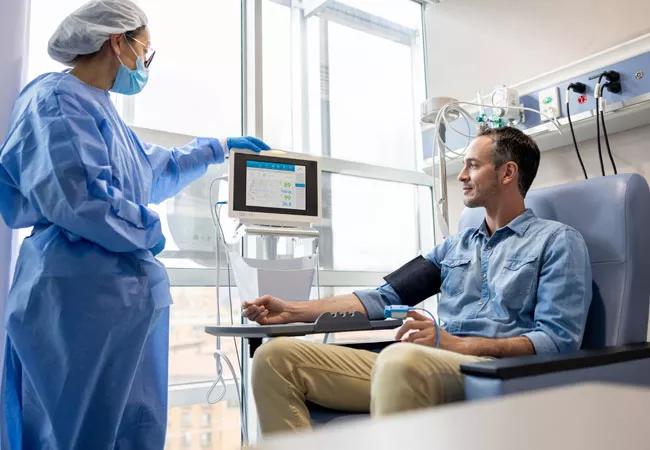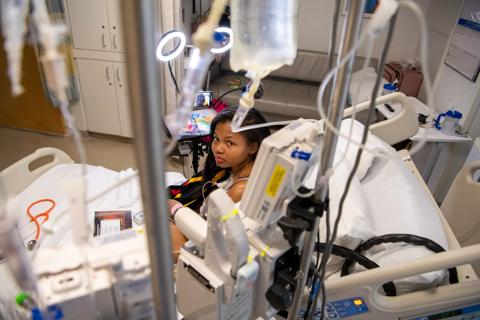Immunological pressure driving genetic mutations

A new study offers potential insights into the genetic underpinnings of post-transplant leukemic relapse in a large cohort of patients. The findings, published in Nature Communications, are the latest from the lab of Cleveland Clinic hematologist and lead author Jaroslaw Maciejewski, MD, PhD, whose groundbreaking research efforts over the past two decades continue to decode the complex molecular and genetic mechanisms of myelodysplastic syndromes (MDS) and myeloid neoplasia (MN).
Advertisement
Cleveland Clinic is a non-profit academic medical center. Advertising on our site helps support our mission. We do not endorse non-Cleveland Clinic products or services. Policy
Allogeneic bone marrow transplant (BMT) is the only curative option for patients with high-risk acute myeloid leukemia (AML) and MDS. This treatment exerts a graft-versus-leukemia (GvL) effect, in which the donor-derived immune response may both eliminate residual leukemia cells and decrease the likelihood of post-transplant relapse. However, some patients relapse anyway.
“In some cases, we know that recurrence is due to disease with high molecular risk features, in which we see the exact recapitulation of the initial myeloid drivers,” says Carmelo Gurnari, MD, hematologist and physician scientist at Cleveland Clinic Cancer Center and Tor Vergata University of Rome, and author of the study. “This is not true for every case, and we wanted to better understand why this transplant failure might be happening for some patients.”
Earlier work from Dr. Maciejewski’s lab has demonstrated that genomic aberrations in the human leukocyte antigen (HLA) region may represent one of the possible forms of clonal hematopoiesis in aplastic anemia, whereby these alterations rescue the hematopoietic stem cell from the autoimmune attack. In the context of AML and MDS, the idea is that the same patterns of mutations could enable leukemic escape from immune surveillance. Dr. Gurnari, in conjunction with colleague and study co-first author Simona Pagliuca, MD, PhD, decided to investigate the role of HLA heterogeneity in disease recurrence after BMT.
“We undertook this broad immunogenetic study in hopes that we could find targets for future translation to the clinical setting,” says Dr. Pagliuca, who was a research fellow at Cleveland Clinic Lerner Institute during the study period and is now a hematologist and physician-scientist at Nancy University Hospital in France.
Advertisement
Researchers examined a cohort of 494 patients with AML, MDS and myeloproliferative neoplasms (MPN) who had received BMT at a median age of 59 years, 29 percent of whom experienced disease recurrence.
“We developed a new bioinformatic pipeline that is able to detect somatic mutations and losses in HLA class I and II,” says Dr. Gurnari. “Indeed, we found that the majority of mutations we saw were in post-transplant samples, and not in samples of patients who had undergone chemotherapy. Furthermore, this was happening at a later time point after transplant, indicating that immunological pressure was driving the mutations and the relapse.”
Researchers also calculated HLA evolutionary divergence, a new immunological measure that captures the level of antigen-immune system interaction in order to estimate its impact in this setting. They performed longitudinal immunogenomic and transcriptomic analysis in a subgroup of patients (N = 55) to broadly characterize potential features of immune dysfunction.
“Given their impact on response to post-transplant immunomodulation, these genomic aberrations can potentially help us to make decisions about post-relapse treatments,” says Dr. Gurnari, who is now studying how the same HLA aberrations may impact leukemic progression in MDS, thanks to an EvansMDS Young Investigator Award. Dr. Pagliuca has received multiple grants from the AA MDS International Foundation and Association pour la Recherche sur le Cancer for her investigations on HLA. The pair has worked together in Dr. Maciejewski’s lab and earlier this year published with him in Leukemia on the molecular landscape of immune pressure and escape in aplastic anemia.
Advertisement
Advertisement

Insights on ex vivo lung perfusion, dual-organ transplant, cardiac comorbidities and more

Insights on bringing Cleveland Clinic even closer to becoming the best transplant enterprise in the world

Consensus statement aims to increase use of the perfusion technology and raise transplant volumes

Minimally invasive pancreas-kidney replacement reduces patient’s pain, expedites recovery

AHA recommendations for pretransplant evaluation, peritransplant and long-term management

First-ever procedure restores patient’s health

The agent-based model aims to improve prediction accuracy

New guidelines expand on psychosocial, sexual health, cognitive and other issues